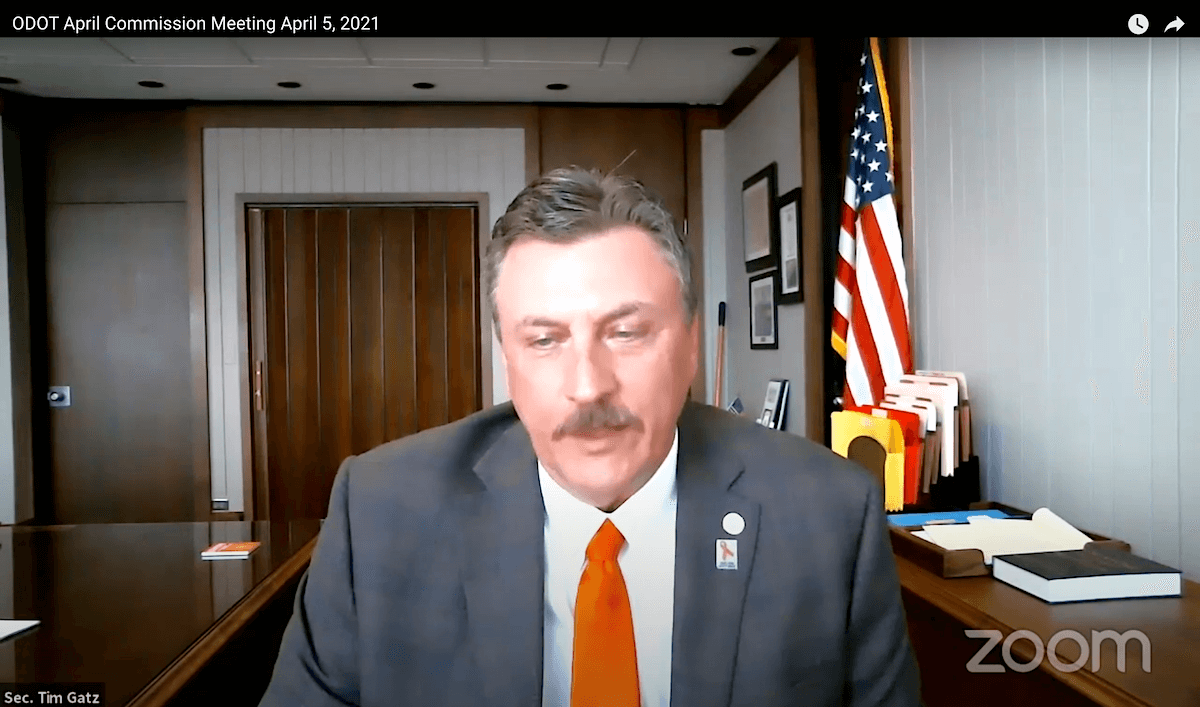In consultation with Gov. Kevin Stitt’s office, the Oklahoma Department of Transportation is creating “new processes and procedures” for highway projects undertaken in partnership with tribal nations, a stark shift in policy that caused Transportation Commissioner T.W. Shannon to ask frustrated questions of ODOT director Tim Gatz during the restructured Transportation Commission’s meeting Monday.
“If what I’m hearing you say is accurate that all tribal projects now that are potential partnerships with ODOT are now receiving a different level of scrutiny, I suspect that all tribal leaders and citizens across the state would have a very important interest in knowing that,” said Shannon, a former House speaker and former secretary of transportation who was appointed to the Transportation Commission in 2019 by House Speaker Charles McCall (R-Atoka). “If I’m coming across more indignant about this than I usually am, part of it is because I was completely blindsided by it. No one from ODOT notified me that there was an issue, either with the McGirt case — I wasn’t notified that there was an issue with this particular project.”
The particular delayed project Shannon brought up Monday involves the reconstruction of a complex interchange between I-35 and State Highway 9 just south of Norman near the Chickasaw Nation’s Riverwind Casino. The casino and the interchange sit within McClain County and, more relevantly, the most northern portion of the Chickasaw Nation Reservation, which a court recently affirmed had never been disestablished by Congress.
While the immediate impact of the U.S. Supreme Court decision in McGirt v. Oklahoma — and subsequent cases, such as the Oklahoma Court of Criminal Appeals’ March 11 ruling that the state of Oklahoma lacks criminal jurisdiction to prosecute a man on death row because Congress never disestablished the Chickasaw Nation — involves criminal jurisdictions, the status of eastern Oklahoma as affirmed reservations has created significant uncertainty around areas of civil and property jurisdiction.
Gatz, who also serves in Stitt’s cabinet as Oklahoma secretary of transportation, leaned on the phrase “uncertainty” when answering Shannon’s questions Monday, which included multiple queries about whether Stitt was attempting to leverage “political influence” over highway projects involving tribal nations. Video of the 26-minute exchange is embedded above.
“I would emphasize the need for a different level of communication with the governor’s office because of some of the uncertainties that have been introduced into our relationships with tribal governments. That’s happening, and it’s not isolated certainly to I-35 and Highway 9 West,” Gatz said. “Most of the projects that are being developed that have tribal partnerships, some of them have agreements in place, some of them will continue to be worked on. But that consultation where we’re at today will need to be going at a higher level of detail as we move forward, and I certainly would be happy to brief the commission in more detail if you believe that is necessary.”
Shannon, who is a Chickasaw Nation citizen and president of Chickasaw Community Bank and said he does believe that is necessary, citing the cancellation of a planned March 22 “kick off meeting” for the Highway 9 project, which falls within his Transportation Commission district. He emphasized that the ODOT’s eight-year plan — which prioritizes highway projects based on a scoring system that values tribal partnerships — has been successful because of its ability to eliminate political leverage as a factor in the agency’s year-to-year decision making. He said the Highway 9 project involved “a gentleman’s agreement” between ODOT and the Chickasaw Nation, which Shannon said has been standard practice. He added that $340,000 had already been spent on pre-engineering work.
“I’m most concerned about the integrity of the eight-year (plan) process because, if it’s accurate what I’m hearing that the governor’s office is exerting political pressure on you or others at ODOT on projects in the eight-year plan, I am gravely concerned about that potential,” Shannon said. “I’m trying to assess from you whether that’s happening or not. I understand legal considerations, but is there political influence coming from the governor’s office on this project? (…) I think I’m hearing — and correct me if I’m wrong — that this isn’t the only tribal project that’s being considered by you, ODOT and the governor’s office as a result of a legal case. I want to make that that is not some ruse for political action.”
Shannon asked whether Gatz could include an overview of all ODOT projects that have tribal partnership on the May meeting agenda of the Transportation Committee, and he also asked to see all emails, correspondence and meeting records with Stitt’s office on the topic.
“That’s going to put you in a real bad position if you’re getting political pressure on projects after the eight-year plan has been so successful and it’s sole purpose is to alleviate that pressure,” Shannon said.”
Gatz said he “can certainly do that” and said a project will still move forward at the I-35 and Highway 9 interchange, but he said it just may not be the proposed design that had been pitched by the Chickasaw Nation, which Shannon said had committed $10 million and land provision to the effort. Gatz said the project involves complex right of way, realignment and signalization issues.
“The thing I’d emphasize is from the eight-year plan, we’re going to continue to work on a project at that location and make improvements,” Gatz said. “We’re going to try to keep everything on schedule.”

‘The implications of tribal compacts and intergovernmental relations’
Reached Tuesday, Shannon declined to comment about the situation or his remarks during Monday’s meeting.
ODOT’s acting chief of media and public relations, Brenda Perry, provided NonDoc with a lengthy statement late Tuesday evening, which said “the complex and evolving nature of this issue” means “ODOT must be deliberate when entering the State of Oklahoma into contractual agreements with tribal governments.”
The entire statement appears here:
The Oklahoma Department of Transportation is one of the primary state agencies that engages with tribal governments on infrastructure projects, and many road and bridge improvements have been successfully completed in close coordination with ODOT’s tribal partners.
The current legal situation surrounding tribal partnerships is more uncertain today when compared to two years ago due to the U.S. Supreme Court’s recent ruling in McGirt v. Oklahoma. Due to the complex and evolving nature of this issue, ODOT must be deliberate when entering the State of Oklahoma into contractual agreements with tribal governments and open lines of communication with all parties is paramount.
Because of the implications of tribal compacts and intergovernmental relations, we are being cautious and seeking additional guidance to ensure new agreements fit the bigger picture as a State in helping these projects move forward. At the request of members of the Oklahoma Transportation Commission, ODOT is gathering information on the issue for presentation at the next meeting in May.
The planned interchange improvements at I-35 and SH-9 West near Goldsby are scheduled in ODOT’s Eight-year Construction Work Plan to go to bid in Federal Fiscal Year 2023, which is a very aggressive timeframe. We are in no way looking at canceling the project at this location and are doing everything we can to keep it on schedule. The design concept proposed by the Chickasaw Nation is worthy of consideration, and our engineers have and will continue to explore other alternatives to ensure that the needs of local roads and all other stakeholders at the interchange are served. This is part of the process for developing any major transportation project which includes carefully vetting all alternatives and bringing all stakeholders to the table.
Given all the moving parts, the department is working to develop and communicate new processes and procedures so that agreements with tribal governments are given appropriate consideration and properly vetted in a way that works for the State of Oklahoma and the tribes.
Legislative reform, congressional negotiations also relevant
Shannon and Gatz, who also serves as the executive director of ODOT, briefly referenced two other factors affecting the situation.
First, Shannon mentioned how Stitt convinced the Oklahoma Legislature in 2019 to grant the governor greater authority over five key state agencies, including ODOT. That reform gave Stitt control over Gatz’s employment as ODOT director, a position previously hired by the Transportation Commission. The 2019 reform also changed the Transportation Commission’s membership to include four commissioners appointed by legislative leaders and five commissioners appointed by the governor.
“The governor’s office shouldn’t be dictating whether there should be kickoff meetings held or not. That should be held at the ODOT level, not at the governor’s office,” Shannon told Gatz. “The Legislature, frankly, put you in a different position than you were in before in the change with the makeup of this commission.”
Gatz, meanwhile, made indirect reference to discussions among Oklahoma’s congressional delegation, Attorney General Mike Hunter and a commission Stitt appointed to look at the potential civil implications of the reservation-affirming court decisions. While it’s unclear what action, if any, may be taken by Congress to address the criminal jurisdiction issue and other pending civil questions, negotiations are ongoing.
“The decision to communicate with the governor’s office on tribal agreements is predicated on me and the need to make sure that I have that line of communication open because again there are discussions going on that I don’t have the benefit of, and I need the advice and counsel of the governor’s office as we move forward,” Gatz said.
After the publication of this story, Stitt’s communications director provided a comment about the situation.
“Oklahomans elected Gov. Stitt to provide transparency and accountability for all investments of taxpayer dollars, which is now more important than ever given the uncertainty caused by McGirt,” said Carly Atchison. “The governor is not surprised that Commissioner Shannon is strongly advocating for the Chickasaw Nation’s pet project leading directly to one of its casinos.”
Follow @NonDocMedia on:
(Update: This article was updated at 3:15 p.m. Wednesday, April 7, to include comment from Atchison.)





















